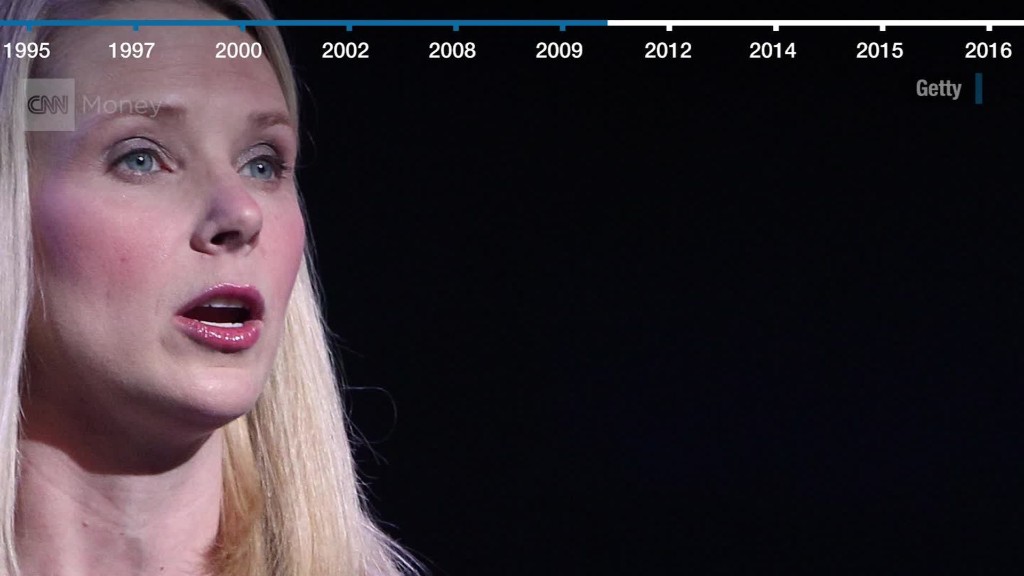
At the beginning of this year, Marissa Mayer gathered with Yahoo's top execs for an off-site meeting.
Weeks earlier, an activist shareholder had called for Mayer to be fired. There were reports that Yahoo was up for sale. Verizon had even publicly expressed interest in buying Yahoo.
Mayer chose to stay positive in the meeting and focus on her long-term product strategy, frustrating some executives who wanted to finally have a real talk about the situation. One former Yahoo executive who CNNMoney spoke with chalked it up to Mayer being in denial. Another executive in attendance that day said Mayer believed her job as CEO was to "paint things in a positive way" and "give people hope."
Unfortunately, hope seemed to be in short supply, according to interviews with current and former Yahoo employees, who spoke with CNNMoney on condition of anonymity.
Top execs had started to flee in the second half of 2015. Some were given six-figure retention bonuses to stick it out through the sale process, according to multiple executives.
Employees who remained at Yahoo struggled to motivate themselves amid all the uncertainty. Some worked on side gigs in the office. Many feared more layoffs, with or without a sale.
Related: Marissa Mayer's payday: 4 years, $219 million
On Monday, a deal was finally announced. Verizon (VZ) agreed to pay $4.83 billion to buy Yahoo's core Internet assets, ending a prolonged bidding process and potentially ending Mayer's tenure as Yahoo CEO.
Mayer said she intends to stay on through the transition, but neither company has said whether there will be a role for the high-profile executive once the acquisition goes through.
Multiple current employees we spoke with were relieved to finally know their new owner, but one employee expressed frustration that Mayer will still be in a leadership role indefinitely. Indeed, Mayer's approval rating has plummeted to 66% among employees, according to data provided by Glassdoor, a job site. That's in stark contrast to leaders at Facebook, Google and Apple, who all have ratings in the high 90s.
It's a far cry from her first days at Yahoo when one employee hung up a poster in the office showing Mayer's face above the word "hope" in bold, capital letters.
Mayer was touted as the best chance to save the aging Internet company after years of failed management, questionable billion-dollar acquisitions, an inability to decide whether to focus on tech or media, and a struggle to reverse its falling ad sales business.
Instead, Mayer will likely go down as the last CEO to run Yahoo as an independent company due to a similar list of mistakes.
Related: Some of Yahoo's media all-stars looking to leave after Verizon deal
Yahoo declined to comment for this story.
Yahoo's lackluster turnaround isn't the fault of Mayer alone. For most of its 21-year-history, Yahoo didn't have a clear purpose. It cycled through CEOs, spent big on buying businesses like Geocities and fell behind newer Internet advertising behemoths like Google and Facebook (FB).
When asked what went wrong under Mayer, one former employee simply responded, "Ask every CEO previous to her."
But the general consensus from Yahoo insiders and analysts interviewed by CNNMoney is that Mayer took an incredibly difficult task and made it harder.
Related: Marissa Mayer defends her reputation at what may be Yahoo's final shareholder meeting
"Mayer put her resources in some of the wrong places, spent a lot of money, and didn't have a lot to show for it," says Jan Dawson, an analyst with Jackdaw Research. "That has to be at least something of an indictment of her leadership."
Under Mayer, Yahoo acquired dozens of startups to boost its mobile team, bought Tumblr for $1.1 billion to broaden its audience and spent lavishly on hiring big names in media like Katie Couric and David Pogue. The bets were bold, but scattered and often handicapped by confused execution.
Tumblr, a popular social network, had struggled for years to make money. Yet Mayer very publicly set a $100 million sales target in 2014 for the service. To achieve that, she put an ad sales exec in charge who clashed with the team and prompted an employee exodus, according to one former Tumblr employee.
Tumblr still hasn't hit that sales goal, leading Yahoo to writedown more than half of its value this year.
Mayer's smaller startup acquisitions succeeded in increasing the size of Yahoo's mobile team tenfold, but many of these new employees soon found themselves assigned to whatever mobile role needed filling, regardless of their interests, according to multiple sources. That led startup founders and talent to depart quicker than expected.
Hundreds of employees were tasked with working on Project Index, a mobile search effort intended to make Yahoo (YHOO) more competitive against the likes of Google (GOOGL). But there have been doubts internally about whether it would see the light of day, given the sale talks.
On the media side, Mayer's big hires seemed to make headlines everywhere, but there were complaints that their stories rarely made it to the heavily trafficked Yahoo homepage.
"The Yahoo.com homepage was full of Kardashians," recalls one Yahoo editor. "We were like, 'Wait, where are all our stories that you're paying us to create?' "
Perhaps the most surprising issue, raised by a former Yahoo executive, was that Mayer wasn't able to recruit more top talent from her previous company, Google.
The one Google exec she did hire, Henrique de Castro, was pushed out after only 15 months -- receiving a generous $58 million severance package for his time.
Mayer may end up with about as much in severance if Verizon doesn't end up having a place for her once the acquisition closes.

